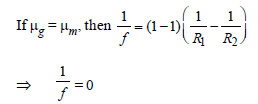Class 12 Exam > Class 12 Questions > When a biconvex lens of glass having refracti...
Start Learning for Free
When a biconvex lens of glass having refractiveindex 1.47 is dipped in a liquid, it acts as a planesheet of glass. This implies that the liquid musthave refractive index. [2012]
- a)equal to that of glass
- b)less then one
- c)greater than that of glass
- d)less then that of glass
Correct answer is option 'A'. Can you explain this answer?
Verified Answer
When a biconvex lens of glass having refractiveindex 1.47 is dipped in...




|
Explore Courses for Class 12 exam
|

|
Question Description
When a biconvex lens of glass having refractiveindex 1.47 is dipped in a liquid, it acts as a planesheet of glass. This implies that the liquid musthave refractive index. [2012]a)equal to that of glassb)less then onec)greater than that of glassd)less then that of glassCorrect answer is option 'A'. Can you explain this answer? for Class 12 2025 is part of Class 12 preparation. The Question and answers have been prepared according to the Class 12 exam syllabus. Information about When a biconvex lens of glass having refractiveindex 1.47 is dipped in a liquid, it acts as a planesheet of glass. This implies that the liquid musthave refractive index. [2012]a)equal to that of glassb)less then onec)greater than that of glassd)less then that of glassCorrect answer is option 'A'. Can you explain this answer? covers all topics & solutions for Class 12 2025 Exam. Find important definitions, questions, meanings, examples, exercises and tests below for When a biconvex lens of glass having refractiveindex 1.47 is dipped in a liquid, it acts as a planesheet of glass. This implies that the liquid musthave refractive index. [2012]a)equal to that of glassb)less then onec)greater than that of glassd)less then that of glassCorrect answer is option 'A'. Can you explain this answer?.
When a biconvex lens of glass having refractiveindex 1.47 is dipped in a liquid, it acts as a planesheet of glass. This implies that the liquid musthave refractive index. [2012]a)equal to that of glassb)less then onec)greater than that of glassd)less then that of glassCorrect answer is option 'A'. Can you explain this answer? for Class 12 2025 is part of Class 12 preparation. The Question and answers have been prepared according to the Class 12 exam syllabus. Information about When a biconvex lens of glass having refractiveindex 1.47 is dipped in a liquid, it acts as a planesheet of glass. This implies that the liquid musthave refractive index. [2012]a)equal to that of glassb)less then onec)greater than that of glassd)less then that of glassCorrect answer is option 'A'. Can you explain this answer? covers all topics & solutions for Class 12 2025 Exam. Find important definitions, questions, meanings, examples, exercises and tests below for When a biconvex lens of glass having refractiveindex 1.47 is dipped in a liquid, it acts as a planesheet of glass. This implies that the liquid musthave refractive index. [2012]a)equal to that of glassb)less then onec)greater than that of glassd)less then that of glassCorrect answer is option 'A'. Can you explain this answer?.
Solutions for When a biconvex lens of glass having refractiveindex 1.47 is dipped in a liquid, it acts as a planesheet of glass. This implies that the liquid musthave refractive index. [2012]a)equal to that of glassb)less then onec)greater than that of glassd)less then that of glassCorrect answer is option 'A'. Can you explain this answer? in English & in Hindi are available as part of our courses for Class 12.
Download more important topics, notes, lectures and mock test series for Class 12 Exam by signing up for free.
Here you can find the meaning of When a biconvex lens of glass having refractiveindex 1.47 is dipped in a liquid, it acts as a planesheet of glass. This implies that the liquid musthave refractive index. [2012]a)equal to that of glassb)less then onec)greater than that of glassd)less then that of glassCorrect answer is option 'A'. Can you explain this answer? defined & explained in the simplest way possible. Besides giving the explanation of
When a biconvex lens of glass having refractiveindex 1.47 is dipped in a liquid, it acts as a planesheet of glass. This implies that the liquid musthave refractive index. [2012]a)equal to that of glassb)less then onec)greater than that of glassd)less then that of glassCorrect answer is option 'A'. Can you explain this answer?, a detailed solution for When a biconvex lens of glass having refractiveindex 1.47 is dipped in a liquid, it acts as a planesheet of glass. This implies that the liquid musthave refractive index. [2012]a)equal to that of glassb)less then onec)greater than that of glassd)less then that of glassCorrect answer is option 'A'. Can you explain this answer? has been provided alongside types of When a biconvex lens of glass having refractiveindex 1.47 is dipped in a liquid, it acts as a planesheet of glass. This implies that the liquid musthave refractive index. [2012]a)equal to that of glassb)less then onec)greater than that of glassd)less then that of glassCorrect answer is option 'A'. Can you explain this answer? theory, EduRev gives you an
ample number of questions to practice When a biconvex lens of glass having refractiveindex 1.47 is dipped in a liquid, it acts as a planesheet of glass. This implies that the liquid musthave refractive index. [2012]a)equal to that of glassb)less then onec)greater than that of glassd)less then that of glassCorrect answer is option 'A'. Can you explain this answer? tests, examples and also practice Class 12 tests.

|
Explore Courses for Class 12 exam
|

|
Signup for Free!
Signup to see your scores go up within 7 days! Learn & Practice with 1000+ FREE Notes, Videos & Tests.


















